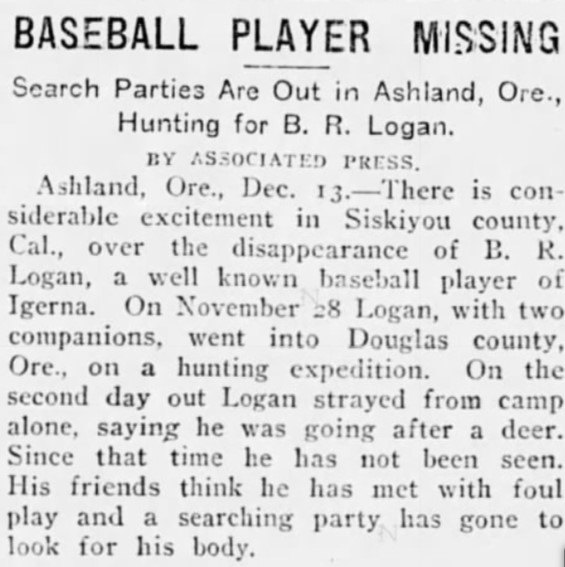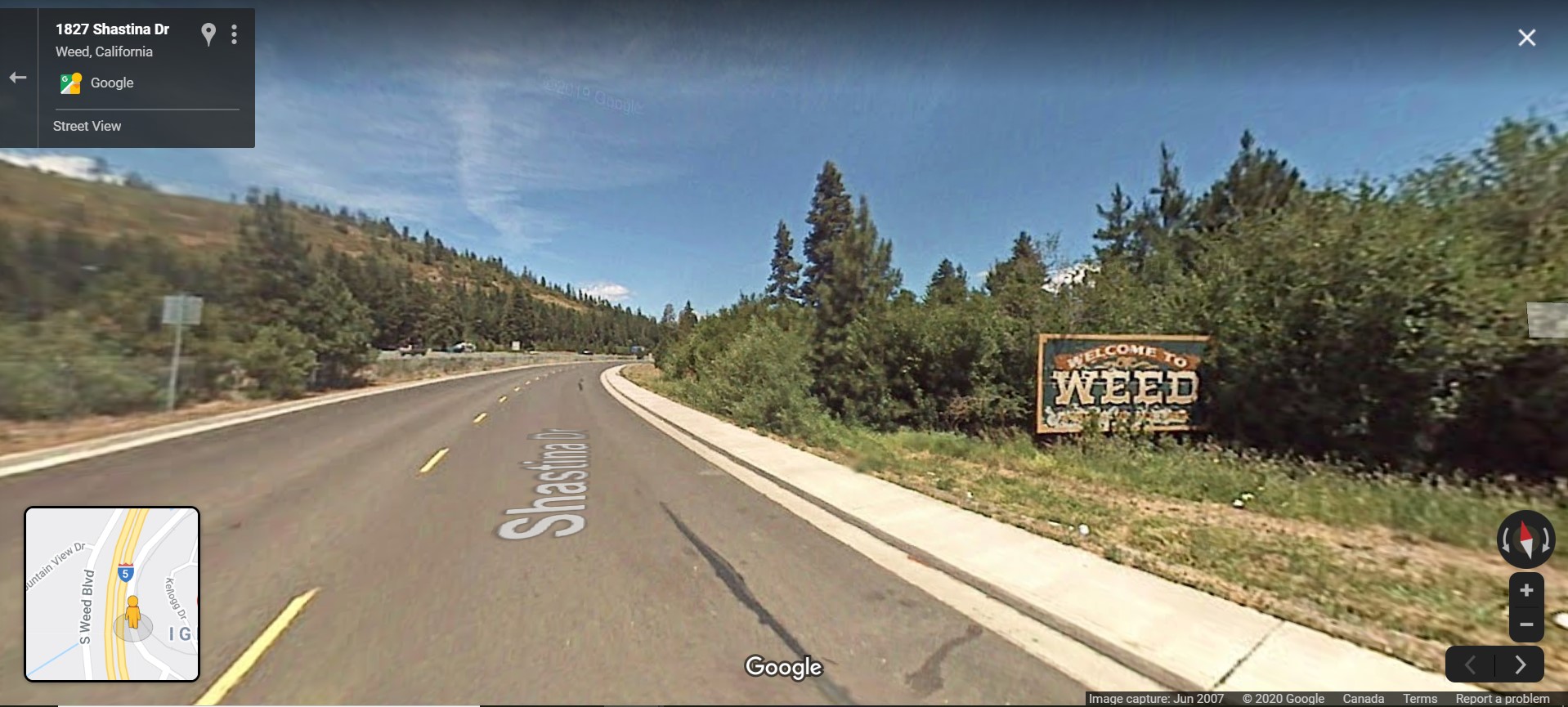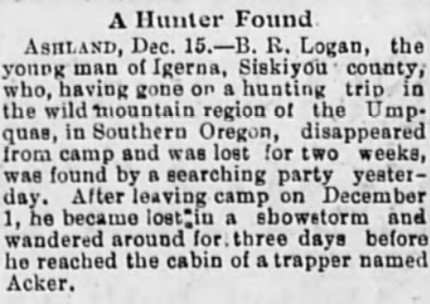Snowstorms, Lies, and the Best Game of Baseball Ever Played
On November 28, 1902, a young man from Igerna, California, headed north with two friends on a hunting trip into the wilderness of southern Oregon. It was an area he would have known fairly well: He often traveled this way on his way to face the baseball nines of various small towns. The young man’s name was B.R. Logan, and he was a baseball player.
On December 1, Logan, outside the cabin where he and his companions were staying, thought he saw a deer. He bade his friends farewell and headed off in pursuit. A day passed. Then another. Then another. His friends began to worry. After two weeks, they began to despair. It was the winter, in the middle of the forest, and there was no sign of their friend.
On December 13, the Associated Press published an item about Logan’s disappearance. “MISSING BASEBALL PLAYER,” it read. By this point, the search party wasn’t looking for Logan. They were looking for his body.

***
The populated area of Igerna, Siskiyou, California — officially part of the city of Weed, California — is about as hard to find as populated areas in the United States gets. I have no notion of how many people live in Igerna. Its newspaper archives exist solely in physical form at various local libraries in Siskiyou County; the websites that may once have housed these newspapers are now dead links. Igerna appears on Google Maps, but there’s no street view of the small roads that lead into it, off to the east. This — a capture from 2007, sandwiched between a rail line and I-5 — is about as close as I can get:

The city of Weed — and, by extension, Igerna — has experienced a lot of the problems that rural areas in the United States have often faced over the last decades. Weed’s population, for one, is in decline. The population of the city proper declined from 2,969 to 2,967 from 2000 to 2010. The area’s economy once relied on logging and sawmills; now, they are reliant on small-scale tourism. In 2014, a 200-acre blaze destroyed 200 structures in the area — like many such towns, their infrastructure was underfunded, vulnerable to fire. And 2016, the billionaire-owned logging company that owned the land on which the nearby Beaughan Spring sits told residents that they would no longer be able to use the spring water they relied on, as it would be bottled and exported. The ensuing legal battle, led by Weed’s mostly elderly residents, has stretched over years, cost hundreds of thousands of dollars; it remains ongoing.
North American society so often perceives culture as only happening in urban areas. This extends to baseball, as well: only a major city, with the budget and population to sustain it, will have a major league team, and only major league teams will really draw attention from fans. Only major league teams have noteworthy rivalries, rich histories spanning generations. For a lot of fans, baseball only exists in major league cities.
Not that there’s anything necessarily wrong with that. The urbanization of culture is, in many respects, a natural consequence of the urbanization of the population in general — especially in North America, the most urbanized continent on earth. But even though the histories created in big cities are the ones that most often grab our attention, the histories of rural areas — though their scale is smaller, though their reach is far narrower — still matter to the people who live there. The narratives are harder to find, but just as compelling. And Igerna, Siskiyou, California, an area that remains unincorporated, was once heavily involved in quite the baseball rivalry — a rivalry that culminated in the greatest game of baseball ever played in Southern Oregon.
***
The year was 1901; the place was Grants Pass, Oregon, a city that had just been incorporated in 1887. At the Grants Pass baseball grounds, on August 12, the local nine — our heroes — readied themselves to face their fated rivals: the team from Ashland, coming to challenge their supremacy over the Southern Oregon league.
That summer was the first season that they played baseball in Grants Pass, and for the team’s whole existence, they had yet to lose a single game. Redding, Medford, Siskiyou; from all around the West they came, trying to score the one run that would finally beat the untouchable newcomers; again and again, they failed. The Grants Pass nine could, and did, beat everyone.
But this game was different. Because this team, the Ashland team, was no ordinary assortment of players, no uncut gems from the roughs of southern Oregon. The Ashland team had once been the kings. No one could challenge them, year after year. These upstarts from Grants Pass, though, had wrested the crown from their heads. They had been relegated to a bitter second place. Twice they had met the Grants Pass team in battle, chances to regain their dignity; twice they had fallen. And the Ashland team could no longer let that indignity stand.
So in this, their final meeting of the season, they cast their net far. All the way to San Francisco, it was said — out to the cities where they had real, professional teams, players who did this full-time. For this all-important game, the battery was plucked from the professional leagues. Two players were real Ashland players; one came from nearby Hornbrook. And the remaining four came from Igerna, home of the best local nine in Northern California. It was an All-Star team.
The Grants Pass players, of course, figured out what was going on. The game was initially scheduled for Sunday the 11th, but the two teams could not agree to play when the Ashland team was clearly not abiding by the spirit of the game. Epithets were screamed, and fights broke out among the gathered fans — scandalous, particularly on a Sunday. But the season was winding down, and the championship had to be decided. So the game was set for Monday.
And that big-time professional pitcher and catcher? They were no match for Martin and Earle, the stars of the Grants Pass team. Grants Pass prevailed, 6-3, having vanquished their enemies once and for all.
Of course, that’s not what the fans of the Ashland nine would have you believe. All manner of stories circulated — that Martin, the alleged “star,” had in fact beaten the Ashland players to the point that they couldn’t play properly. That their professional pitcher, Harper, had been beaned on the arm intentionally, and that his unjust injury had caused the defeat. That the Ashland team had to make a hasty escape from Grants Pass to avoid being viciously assaulted by the team of “ruffians.”
The Grants Pass Weekly Rogue River Courier, for its part, denounced these as nothing more than vicious, jealous lies — and not even particularly convincing ones:
The amount of prevarication concerning baseball matters that has been turned loose in the city of Ashland is so stupendous as to require attention and correction.
The people in that city who so desire should be given an opportunity to know the truth in regard to this as well as other matters.
Whether or not the fluent talkers who have flooded the Granite City with falsehood attended the famous game on August 12 cannot be determined from the reports. Fully as intelligent prevarication could be accomplished by those who were a thousand miles away and knew nothing of the facts.
Whatever the truth was about that incredible game, a game where “each side played with vim and stubbornness and every tally made was fought for,” the fate of the Grantland nine is indisputable: After surviving an 11-inning, 1-0 nail-biter to clinch the Southern Oregon championship, they closed their season with a 15-2 romp over Roseburg — undefeated.
***
On December 19, 1902, almost three weeks after Igerna baseball player B.R. Logan went missing, this notice was published in the Albany Democrat of Albany, Oregon:

I can find no more tale of B.R. Logan — of those weeks he spent with the fascinatingly mononymic Acker, of the days he spent wandering in the snow; of the summer evenings he spent playing baseball before he got lost, nor the days he lived afterwards. I don’t know if Logan played in that great game; if that’s how he came to know the Ashland area, if that’s where he met his friends. Lacking a first name as an identifier, and with the limited availability of archival materials from Siskiyou County, the only possible hint I can find of who B.R. Logan was is this unmarked grave in the Winema Cemetery of Weed, California. Even then, it’s a long shot: the B.R. Logan who played baseball for Igerna in 1902 could have gone anywhere, done anything. Life in Igerna, working as a sawyer or a logger, wasn’t easy. Maybe Logan went looking for something better; maybe he shed his identity, became a new person somewhere else. Maybe he played baseball, still, or maybe he didn’t.
Without B.R. Logan’s snowstorm, though, I would never have found out about the rivalry between Grants Pass and Ashland — about the passion these people in these small frontier towns, unheard of by most of the nation, carried for their local nines. About the histories they spun in evenings spent around the diamond. In these towns, struggling for identity and survival, the local amateur baseball teams were one thing their citizens could have pride in. They were something that could live on, 50 or a hundred years into the future, even if the towns themselves didn’t survive. They gave meaning to places that, to the cruel sweep of a nation’s ambition, often didn’t mean much at all.
***
In 1913, Igerna burned to the ground. The town was already on the decline, sparsely populated. The lack of resources made their infrastructure weak and unprotected, vulnerable to fire. Fifty-thousand dollars’ worth of damage, the cement plant that now accounted for most of the town’s jobs destroyed; it was a death blow, the newspapers said. Igerna couldn’t survive.
In 1920, 5,480 acres of forest near Igerna was bought by a wealthy former Oregon banker for $40,000.
RJ is the dilettante-in-residence at FanGraphs. Previous work can be found at Baseball Prospectus, VICE Sports, and The Hardball Times.

Really enjoying this series, Rachael!
This is the best one yet.
I anticipate I’d buy a book.